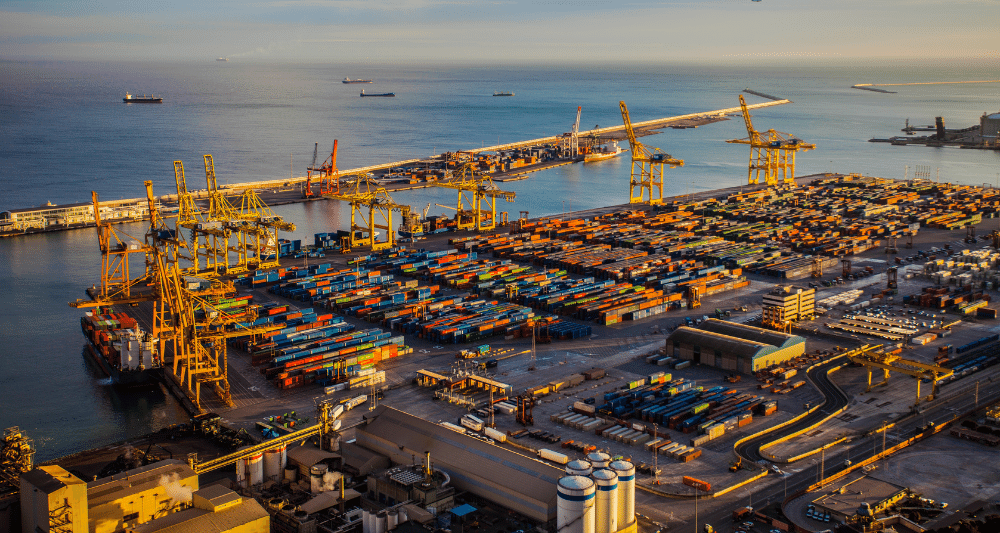
Seaports have long been an intrinsic part of international trade, and with more than 90% of the worlds’ traded goods being transported by sea, the ocean is without doubt one of the major transport arteries for global business. The importance of seaports on an international, national and regional basis stretches far beyond the facilitation of trade however, as we shall explore in this article.
Seaspace International Forwarders specialise in the transport of a huge range of products, via air, sea or land. For more information about domestic and international sea and air freight rates or any of the other services we offer call us today on 01293 554620.
What are seaports?
Seaports are maritime facilities which typically comprise one or more wharves or loading areas, enabling the transfer of cargo and passengers by ship. Ports are usually situated on sea coasts or estuaries but can also be found far inland, with access to the sea provided by adjacent rivers or canals.
Busiest seaports in the world
One of only 4 large-port megacities, in 2019 the port of Shanghai became the busiest seaport in the world, handling a staggering 43.6 million TEUs (twenty-foot equivalent units) of cargo volume (or 542.46 million tonnes of cargo), overtaking its Singaporean counterpart. Situated at the mouth of the Yangtze River the port encompasses an area of 3,619.6km² and is accredited as being one of the key factors in the growth and development of Shanghai. Other major ports include the Port of Singapore (Singapore), Port of Shenzhen (China), Port of Ningbo-Zhoushan (China) and Port of Guangzhou (China).
Busiest seaports in the UK
To put those figures into perspective, the port of London (London Docklands) is estimated to be the busiest seaport in the UK, with a tonnage throughput of 12.8 million tonnes of cargo. At just 22km² it’s c164x smaller than the port of Shanghai.
Goods imported to the UK 2020/21:
‘Between June 2020 and June 2021 the United Kingdom imported over 157 billion British pounds worth of machinery and transport equipment goods…’. [Source]
Goods imported to UK port facilities order of volume imported:
- Machinery and transport equipment
- Miscellaneous manufactures
- Chemicals
- Material manufactures
- Food and live animals
- Fuels
- Raw materials
- Beverages and tobacco
- Unspecified goods
Importance of seaports
Seaports are vital to economic activity in coastal areas, areas which are typically some of the most deprived. A study conducted by the Social Market Foundation found that “…coastal communities are among the worst off for earnings, employment, health and education.”
The higher the throughput of goods and passengers through maritime ports, the higher the investment in local and port infrastructure, provisions and associated services. This activity serves to benefit both the regional and national economy, facilitating socio economic and political development.
National and regional economic development and accessing international markets
The growth of seaports and maritime related trade directly and indirectly stimulates both national and regional economic growth. By providing access to global supply chains, seaports enable countries to access international trade markets, which should in theory boost economic development. International trade also allows consumers access to products and services which are not typically found within that country, whilst allowing countries to utilise resources such as labour, technology or capital.
Contribution to UK GDP (Gross Domestic Product)
Accurately calculating the exact impact of seaports to national and regional economies is extremely difficult. Though figures vary, it’s estimated that the shipping industry contributes around £19 billion to our national economy, around 1% of UK GDP. However this positive contribution relies on the continual port development and the improvement of port efficiency in order to maintain the ability to compete for cargo.
Boosting local employment
Again, identifying the exact number of job roles created by the maritime industry is tricky, but some research suggests that in the UK port activity contributes towards around 181,000 jobs. As operations become increasingly automated these figures are expected to change significantly, and so the long term benefit to employment remains to be seen.
Establishment of inter-country social, political and economic relationships
Maritime transport is responsible for the global movement of both passengers and cargo. As a result it is both directly and indirectly responsible for influencing social, political and economic relationships between nations.
Allied countries can offer options such as free trade amongst themselves whilst restricting trade movement with unaligned nations, impacting social and economic relationships.
International freight forwarding services
We have links with all major seaports in the UK and overseas, and our sea freight shipping services include:
- Imports and exports
- LCL (less than container load) and FCL (full container load) shipments
- Conventional and out-of-gauge loads
- Imports customs clearance
- NES export declarations
- Import licensing applications
- Hazardous cargo shipments
- Customs warehousing
Get a quote for your freight needs
Want to find out more about our sea freight services? Or would like a quote for a shipment of goods? Get in touch with our team, we’d love to hear from you. Simply call us on 01293 554620 or email info@seaspace-int.com.
